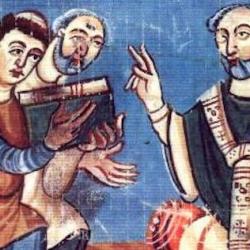Early medieval evangelists had theological reasons for targeting their evangelistic efforts to kings. Kings were heads of political bodies; convert the head, convert the body.
In a summary of the Carolingian Renaissance, James Hunter (To Change the World, 59) offers a more pragmatic reason for the tactic: “the monasteries were outposts of evangelization. In this, the monks focused on the regional and local aristocracy rather than on the rusticus, the common people. As a rule, the higher up in the social hierarchy, the better for the church, for they were the ones who had the local influence necessary to diffuse the faith among their dependents.”
Besides, the conversion of a nobleman or king provided cover for people lower down the social scale: “Once a kind had been converted, then the local nobility and others could convert without fear.” Hunter offers a list of the kings who became Christians during the second half of the first millennium—Clovis, kings of Kent and Northumbria, Hungary, Bulgaria, Kiev, and Scandinavian kings.
Rather than start at the bottom and put converts on a path of potential martyrdom, the monks started at the top and avoided the possibility of martyrdom. No doubt the monks agreed with Tertullian that martyrdom is the seed of the church, but they were hard-headed medieval pragmatists who didn’t court hostility when they could avoid it.















